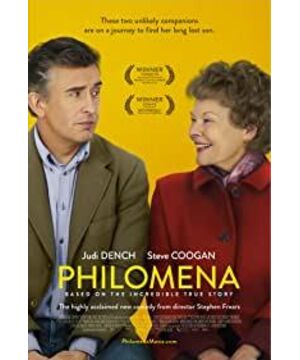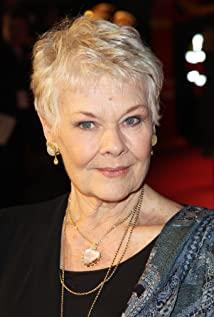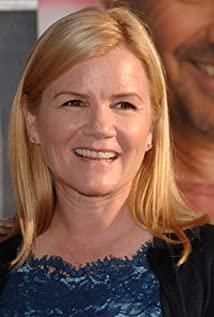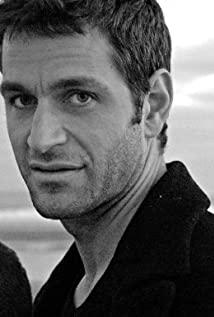What can be more heartbreaking than taking a young child away from his mother who loves him so much? What can destroy the faith of a devout believer more than selling a child by a religious person who appears to be charitable? What else has the most basic needs of human psychology more than the mother Qianli Xunzi? The British film "Philomena (Philomena)" intercepted an unbearable real event, and used sophisticated light and shadow techniques to sort out the ordinary and intense human emotions unusually and remotely.
The script of the film has an ingenious structure. Such an ingenious structure can precisely distribute the compactness and density of the narrative to meet the needs of the movie. The pattern of the film is not large, although the characters travel between Europe and America due to the theme of finding children. , But this geographical span does not make the film appear messy, on the contrary, it appears orderly due to the clear theme and reasonable basic structure.
The film contains deep connotations in the seemingly obvious theme of finding children, especially the part about religious beliefs. The film is intertwined with the collision and confrontation of two completely different positions. The attitude of the journalist Martin Skssmith and the old woman Philomena towards religious beliefs reflects the thinking mode and mentality of the two classes. The well-informed journalists represent some so-called insightful people, who are based on their own With their knowledge system and experience horizon, they have a strong aversion to the hypocrisy and deceptiveness of religion. They use a relatively objective and rational standpoint to look at the beliefs entrusted to their spirits. They seem to be always awake and criticize the world. The bad, even the dark side, they will always have the indignation of idealism encountering the hard walls of reality, and because of this, such people always lack the most basic peace and tranquility in their hearts.
Philomena represents the ordinary people who have not received much education and do the lowest level of work. She believes in religion throughout her life. Even if she is hurt by those dogmas, she still chooses to rely on the power of faith to survive the hardships of life, even if she is young The old woman was in a trance for a moment due to extreme despair, but she always hoped that she could be redeemed. Some cliché best-selling love novels can also make her happy. Even if she encounters misfortune, she still believes in the same kind of love stories told in those series of romance novels, and she never gets tired of it. After experiencing the deadliest tragedy and a series of struggles, Philomena can still talk about another clichéd love story to reporters. This kind of ending is rather moving. A simple and kind person can always make people sigh and wish her sincerely. Some people think that Philomena’s beliefs and spiritual realm are the source of her suffering. I would like to ask who in this world is not suffering. Isn’t that clear-headed reporter who knows the remote history of her own thinking and spiritual realm? What's the pain?
There are several plot settings in the film that are quite creative and intriguing-the son finds the monastery where he was born while his mother is unknown, and chooses to bury his bones here; while the mother is in the unknown. Under the circumstances, looking for her son; the reporter had close contact with Philomena’s son, who was an assistant to a politician under unknown circumstances... But the old nun who always knew the whereabouts of the mother and son remained silent, when the reporter deceived it The nun was still plausible when her behavior expressed her anger. However, this evil crime hiding under the religious color was finally forgiven by Philomena, because she didn't want to live so uneasy as a reporter.
The performance part of the film is also impressive. The storyline of the film leaves a lot of room for the actors to perform. Both Judy Dench and Steve Coogan have a good sense of the performance. There are a lot of emotional dramas and they want to vent, which reflects their deep understanding of the role, the role and their inner world, and also reflects that they are all actors with profound performance qualities. Coogan is also one of the screenwriters of the film. His performance in the film not only sets off the role of Danki, but also portrays the characters in a reasonable and reasonable manner.
Danqi’s performance is very real and natural, which gives this film based on real events and reporters’ books the most reliable representation. When Filomena learned that the reporter had a relationship with her child, she kept on Inquiring about the details, Dan Qi's eyes flashed with the light of maternal love at this time. When Filomena finally uttered the words of forgiveness, through Danqi's relatively restrained and relatively moving language and expressions, the audience deeply felt that it was not easy for her to say this, and realized that this short sentence was repeated in her heart. The number of times I have passed, and every time I toss and turn is to carve traces.
What is more gratifying is how the main characters are portrayed in the film. It is not so much that Filomena, who Dan Qi interprets, is a devout old lady who believes in religion. It is better to say that she is a good person who has gone through hardships and still possesses the qualities of true innocence and kindness. It is precisely the most powerful part of the film.
(Magazine manuscript)
View more about Philomena reviews











